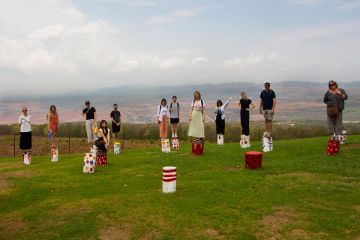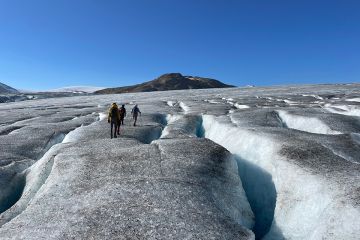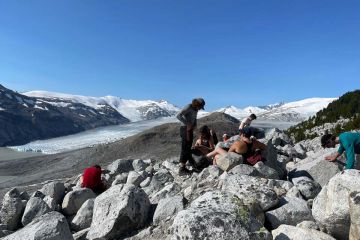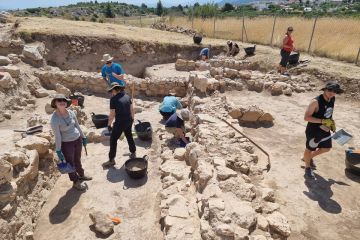Xenia near Arma - An international field school
- Tara Sharpe

The people of ancient Eleon left many traces, but very few coins are being unearthed at an active archaeological site near the village of Arma in central Greece. The earliest inhabitants lived in pre-monetary times.
And money mattered far less than hospitality when 27 people arrived this summer. Dr. Brendan Burke, chair of UVic’s Department of Greek and Roman Studies and lead investigator for the Eastern Boeotia Archaeological Project (EBAP), says generosity isn’t on a budget in Arma nor in the small coastal town of Dilesi where they lived for two months: “Even though the economic crisis is still fairly bad in Greece, we were treated with great Greek hospitality, or xenia as it is called there.”
The five-year project began its second full season of digging this summer. A Greek-Canadian collaboration, the EBAP group included undergraduates, graduate students and staff members, nearly half of them from UVic and the rest from Wellesley College, other universities, and the Ninth Ephorate of Prehistoric and Classical Antiquities at Thebes.
The site contains architecture, sculpture, and ceramic remains dating back to the Late Bronze Age, but the most prominent feature is a large wall of roughly cut, custom-sized rocks. This structure, the last remaining hint of an impressive acropolis, mimics earlier Mycenaean construction; the architects of Eleon were intentionally elaborating on their own recent past. Now students sift through the same soil.
Student perspective
Fourth-year undergraduate student Max MacDonald (Greek and Roman Studies) describes the area: “One day, we held an open house for the villagers and were totally blown away when nearly 200 people from all over eastern Boeotia came to see our work. It was an excellent way to end the season, and it really reminded me that archaeology isn’t just about the ancient past, it can give an entire region a feeling of community.”
“I think everyone in my family was surprised when I said how much I love working with a big pickaxe and pushing around a wheelbarrow,” says Samantha Bartlett (Greek and Roman Studies, Anthropology), also in her fourth year at UVic. “A major component to digging is, of course, the physical labour. We dig tons of dirt (literally) every day. If the wheelbarrow is full and it’s a scorcher of a day, there will be an unspoken rotation of taking turns so not one person gets tired.
“As an Anthropology and Greek and Roman Studies major, my worlds very perfectly collided on this project. And the people who work on EBAP, experts in their field, are so willing to teach and explain. For instance, our conservator was kept extremely busy all season but she [still found time to teach] how to gently clean the face of a twenty-five hundred year-old figurine.”
All about community
Burke was particularly struck by how EBAP “halfway around the world” from Ring Road is helping to nurture an engagement with community. “Greece is part of our ‘community,’” he explains. “The site shows ancient evidence of continuity, of life following great economic disaster.” Millennia later, the UVic group circled the globe to get there while ties between people—ancient and modern, North American and Mediterranean—came full circle in one site.
There are only two other active Canadian excavations in Greece at present. EBAP is funded through private donations and grants including from the Social Sciences and Humanities Research Council. The excavation will continue in 2014. Contact bburke@uvic.ca for more information about this international field school.
Student blog: ebapexcavation.blogspot.ca
Canadian Institute in Greece (more on archaeological site): http://bit.ly/SBb2sY
In related news
A UVic PhD program in Greek and Roman Studies was recently approved; the department is now accepting applications for entry in September 2014.
Photos




In this story
Keywords: field schools, history, international, student life, Greece
People: Max MacDonald, Samantha Bartlett




